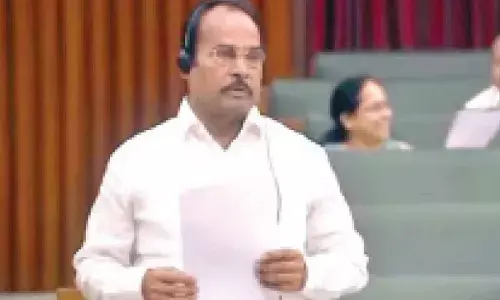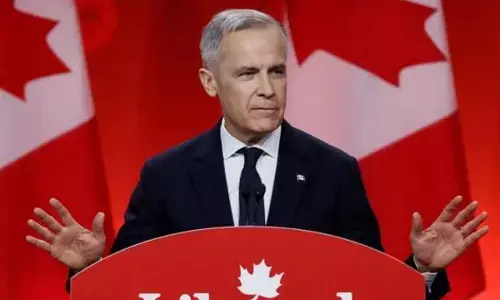The real story behind power price rise

 Post Cold War drive for hegemony over natural resources by the single super power has significantly shaped global events; particularly, hegemony over energy resources has dominated the contemporary political landscape. This led to invasions in regions rich in hydrocarbon; Iraq and the forced regime change in Libya; continuation of NATO forces in Afghanistan underline such centrality of hydrocarbon in the global power game.
Post Cold War drive for hegemony over natural resources by the single super power has significantly shaped global events; particularly, hegemony over energy resources has dominated the contemporary political landscape. This led to invasions in regions rich in hydrocarbon; Iraq and the forced regime change in Libya; continuation of NATO forces in Afghanistan underline such centrality of hydrocarbon in the global power game.
Oil and gas is the key to domination. Apart from physical occupation by giant Western MNCs, it is achieved by financing hydrocarbon as commodities. International pricing of oil and gas is no longer the exclusive prerogative of producers; but today, oil prices are being manipulated by financial behemoths of Wall Street. This was found by a US Senate Committee on Investigations. The committee scrutinizing the phenomenon of fixing international oil prices came to the conclusion that speculation is the root cause of extreme volatility in the international crude oil market. And skyrocketing of oil prices led to disproportionately high profits for financial intermediaries who thrive on trading in oil futures.
Wall Street has been amassing wealth by earning super profit in trading with oil and gas `futures', leading to massive increase in prices of food and other essential commodities impoverishing the poor of the world. Back home in India, criticality and blackmail of corporates to doctor government policy is assuming a humongous magnitude.
A new distinctive feature of economic policy landscape in India drawing its inspiration from global policy compact of neo-liberalism is to ensure handing over of our natural resources cheap. Pertinently, such an act of relinquishing control to private corporates has necessitated re-authoring of policies.
These processes have obviously led to emergence and reinforcement of a powerful nexus of corporates, politicians and bureaucrats. It is this nexus which has proved to be the fountainhead of corruption of unprecedented proportions in recent times.
A watershed in this sequence of sinister developments was the 2G scam. In a clear pointer to this nauseating development, the Supreme Court's historic order pronounced: "In conclusion, we hold that the State is the legal owner of the natural resources as a trustee of the people, and although it is empowered to distribute the same, the process of distribution must be guided by the constitutional principles, including the doctrine of equality and larger public good." But such voices of sanity and wisdom are proving to be of no avail. The most graphic example of our neo-liberal mandarins' thinking is underlined in KG gas pricing issue. The main beneficiary of the series of government's decisions has been the topmost corporate of the country, Reliance Industries Limited.
Beginning with the 21st century, Reliance announced a huge find of natural gas deposits in an offshore block in the KG basin. It was a time when the Ambani siblings were dividing their corporate empire. RIL refused to honour its contract with Anil's power utilities at $2 and odd. This became the most sensational story for corporate-driven business media. But while highlighting separation of the brothers, what was downplayed, along with Anil, RIL was also hedging on its contractual agreement with a Navaratna PSU, the NTPC, to supply gas at the same rate. When the NTPC wanted to fight out in courts to force RIL from reneging from its contractual obligation, the NTPC was disallowed. Obviously, Reliance had its way.
Reliance had asked for a price for its KG gas pegged at $ 4.8. The government conceded virtually everything, not based on scrutiny of techno-economic details of the RIL claim, but the issue was settled by a Group of Ministers. The RIL explanation for increase in the price was that the KG gas reserves were of such large magnitude that this needed a huge investment. The government did not even bother to contest this argument. Large production ought to have brought down the unit price. The contract was till 2014.
As a result of the increasing price for KG gas, Reliance valuation soared and they sold 30 per cent stake to BP for a huge premium. For the last few years, we are witnessing a 'black' drama with Reliance subsequently claiming that it had made a technical mistake in appraising the nature of the deposit. New technologies are necessary to extract the gas which would need involvement of foreign partners. And they needed the price to be higher at par with the international prices; this was while they were refusing to be examined by the CAG and outside technical experts.
That the government would bend was apparent when an ideologue of the neo-liberal camp, Rangarajan, headed a committee tasked to make a recommendation. It did so - facilitating RIL's wish � aligning KG gas price with international prices. Jaipal Reddy, the Oil Minister who was refusing to capitulate, was 'shown the door'. The PM himself, in his short intervention in the NDC meeting finalising the 12th Plan, advocated the raising of energy prices for attracting investment.
In the event, the Cabinet has now decided to double the price of natural gas, a major input for production of fertilizers and power, from 4.2 dollars to 8 dollars per mmbtu, though this will have a cascading impact increasing prices and burdening common people. Reliance, virtually blackmailing the country by keeping production of natural gas in Kg-D6 gas basin below the stated target till price is increased, will be the main beneficiary. Conservatively, every dollar increase in gas price will increase Reliance's profits by at least 74 million dollars.
The hike is irrational even when compared with gas- exporting countries where the price of domestic gas is much lower. For example, in Gulf countries the price is only $ 1 per mmbtu, in Egypt $ 2.57, in Nigeria $ 0.11, in Australia $ 5 and in Indonesia around $ 1.
Additional subsidy that the Government would have to bear at present prices of fertilizer and gas-based power is estimated to be Rs.71, 250 crore for a five-year period. This Government which claims it does not have funds to ensure a universalized food security system, is prepared to subsidise profits of a powerful corporate house.
The Government will pass on much of this burden to the common people. Farmers will have to pay more for fertilizers; price of CNG gas used by public transport in many cities will also be hiked, as will electricity tariffs. Drumbeats for 2014 electoral mega contest have been sounded. Corporate support is up for grabs. With Modi's track record of being aggressive and total in extending benefits to corporates is forcing the ruling dispensation to be desperate.
And it is this 'compulsion' which has resulted in this huge largesse being doled out to the top corporate; the rest is pure 'academic' theorization. There is nothing else for the aam aadmi but to speak out against such a sinister move.











